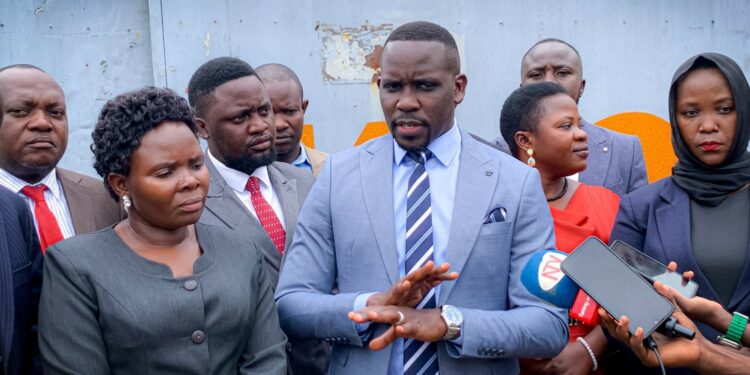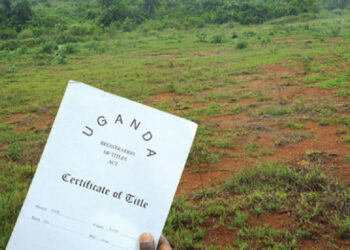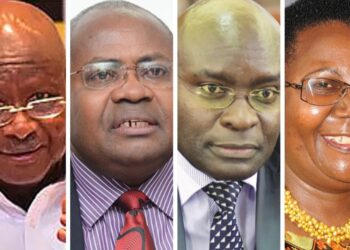In an incident that has stirred debate over the balance of power between investors and the rule of law, the Leader of Opposition, Joel Ssenyonyi, was on Monday blocked from accessing the premises of Roko Construction Company.
His visit was aimed at probing the company’s use of a staggering Shs263Bn bailout it received from Ugandan taxpayers. Ssenyonyi’s attempt to investigate how these funds were used comes amid alarming reports that Roko employees had gone four months without pay, despite the massive financial injection from the government.
Speaking to Parliamentary journalists in Kawempe, Ssenyonyi revealed that the government is planning yet another supplementary budget in which Roko is expected to benefit from additional taxpayer funds. His concerns focused on the lack of transparency and accountability regarding the previous bailout, which was meant to stabilize the company’s operations.
“This Company has been given over Shs263.3Bn and we understand that Government is coming back to request more money on their behalf. That is why we came here to establish, what is this money doing. We have been getting calls from the staff who have been telling us for 3-4 months, they haven’t been paid a salary and yet they are required to work,” Ssenyonyi explained.
Ssenyonyi had written a formal letter to the management of Roko Construction Company on the 8th of October 2024, informing them of his planned visit. However, upon arrival, the opposition leader and his team were denied access to the premises. Instead, they were met with a letter from Mark Koehler, Roko’s Managing Director, stating that the Board of Directors had declined to admit them.
“The Managing Director says that they consulted the Board of Directors, and the Board has politely declined to admit you and members of the Shadow Cabinet to the premises of the company,” Ssenyonyi narrated, highlighting what he believes is a troubling pattern of government’s financial favouritism towards certain private companies. “The way the Government keeps dishing out money to private companies is very problematic.”
His frustrations echoed a much larger concern about the government’s relationship with Roko Construction, which has been entrusted with several high-profile projects such as the Lubowa Hospital and the new Parliamentary chambers. Despite receiving billions of shillings from the government, Ssenyonyi questioned why the company continues to exhibit signs of financial distress.
One of the most pressing issues raised by Ssenyonyi was the fate of major projects managed by Roko, which seem to be perpetually delayed. “The Parliamentary Chambers building was meant to be completed in the 10th Parliament. We are now in the 11th Parliament, and it is going to end, yet there is nothing much happening there,” he pointed out, emphasizing the financial strain caused by these delays.
Meanwhile, Parliament continues to spend billions in rent for offices at locations like Kingdom Kampala and Queen’s Chambers. “That is what I call a nugatory expenditure—it is a financial loss to the taxpayer,” Ssenyonyi stated, drawing attention to the paradox of investing billions in a construction company while still paying rent for parliamentary offices due to delayed project completion.
His concerns didn’t stop at the delays, however. Ssenyonyi defended his impromptu visit to Roko, noting that it was prompted by distress calls from company employees who had not been paid for three to four months. “We hear they want to come to Parliament again for a supplementary [budget], for more money. What is that money doing if staff are not being paid, if the projects meant to be done aren’t being run?” he asked, expressing frustration over the lack of transparency surrounding the company’s finances.
In Uganda’s constitutional democracy, Parliament wields significant power as the ultimate legislative authority. It is entrusted with critical responsibilities such as approving the national budget, scrutinizing government expenditures, and holding both public and private entities accountable.
No investor, regardless of their size or influence, should be able to overlook this institution, as it is Parliament that ensures that taxpayer money is used transparently and in the best interest of the nation.
Through its committees, like the Public Accounts Committee (PAC) and the Committee on Commissions, Statutory Authorities and State Enterprises (COSASE), Parliament exercises oversight by summoning officials, reviewing financial reports, and investigating irregularities.
Any decision involving large sums of public money, such as bailouts or government contracts, requires Parliament’s approval, making it nearly impossible for any company to bypass this scrutiny without the backing of the executive arm of government.
However, the growing influence of certain private investors can sometimes overshadow these institutional safeguards, especially when combined with the Cabinet’s authority to propose supplementary budgets or influence financial decisions.
When such investors receive uncritical backing from the Cabinet, as in the case of Roko Construction Company, they may act with impunity, knowing that the government will protect their interests, even in the face of parliamentary inquiry.
This type of influence creates a dangerous dynamic where investors may feel they can sidestep accountability mechanisms and diminish the power of Parliament, raising questions about the transparency and integrity of government decisions.
Do you have a story in your community or an opinion to share with us: Email us at editorial@watchdoguganda.com













